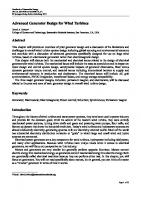Biohydrogen III Renewable Energy System - Biological Solar Energy Conversion [1 ed.] 9780080443560, 0-08-044356-7
Hydrogen is an almost ideal fuel and its wider use will result in an improvement in the environment due to factors inclu
278 71 462KB
English Pages 196 Year 2004
Table of contents :
Cover......Page 1
To Contact the Publisher......Page 2
Preface......Page 5
Contents......Page 7
Hydrogen Production......Page 9
Introduction......Page 11
Water-Splitting Systems by Renewable Energy......Page 12
Sonalysis and the Bubble Fusion......Page 14
Hydrogen Storage Systems......Page 16
Hydrogen Utilization Systems......Page 17
References......Page 19
Abstract......Page 21
Hydrogenase Structure......Page 22
Why Thiocapsa Roseopersicina BBS?......Page 24
Sensor Hydrogenase (HupUV)......Page 26
Accessory Genes Participating in the Assembly of NiFe Hydrogenases in T. Roseopersicina......Page 27
hypF......Page 29
Heterologous Complementation Studies......Page 30
Methanotrophic Hydrogenases......Page 31
Multiple Hydrogenases......Page 32
Hydrogen-driven MMO Activities......Page 33
Biogas......Page 34
Acknowledgements......Page 37
References......Page 38
Photoproduction of Hydrogen by Inorganic Semiconductor TiO2- Hydrogenase Model System......Page 41
Photoproduction of Hydrogen by Inorganic Semiconductor Cds - Hydrogenase Model System......Page 43
Production and Oxidation of Hydrogen by Hydrogenase with Metal as Electron Donor/Acceptor......Page 44
Hydrogen Enzyme Electrode for Renewable Energy......Page 45
Hydrogenase in Energy Saving and Environmental Protecting Systems......Page 46
Conclusion......Page 47
References......Page 48
Photosynthesis and Photobioreactor......Page 51
Abstract......Page 53
Cultivation......Page 54
Growth and Hydrogen Production......Page 55
Carbon Sources......Page 57
Light Intensity......Page 60
Summary......Page 61
References......Page 62
Introduction......Page 65
Definitions and Units......Page 66
Cultivation Regime......Page 67
Photobioreactors......Page 69
Low Saturating Light Intensity Comparing with Sun Light......Page 70
Low Specific Rates of Hydrogen Photoproduction......Page 71
Methods and Matrixes for Immobilization of Photosynthetic Microorganisms......Page 72
Hydrogen Production by Immobilized Cultures......Page 73
References......Page 76
Hydrogenase......Page 81
Cyanobacterial Hydrogenases......Page 83
Cyanobacterial Biohydrogen......Page 86
Future R&D and International Cooperations/Networks......Page 88
Referenes......Page 89
Our Needs for Exploitation of Renewable Energies......Page 91
Merits of Photobiological Hydrogen Production Utilizing Cyanobacteria......Page 93
Enzymes of Cyanobacteria Involved in Hydrogen Metabolism......Page 94
Construction of Hydrogenase Mutants and Effects of Deletion of Hydrogenases on Hydrogen Production......Page 95
Possible Means of Improving Hydrogen Production Activity......Page 96
Concluding Remarks......Page 98
References......Page 99
Introduction......Page 101
General Considerations......Page 102
Direct Biophotolysis......Page 104
Photofermentations......Page 105
Dark Fermentations......Page 106
References......Page 107
Bio Molecular Device......Page 109
Introduction......Page 111
Algae Strains and Growth Condition......Page 112
Isolation and Analysis of RNA......Page 113
Isolation and Characterization of the [Fe]-Hydrogenase Gene from C. Moewusii......Page 114
Structural Characteristics of HydA from C. Moewusii......Page 116
Molecular Phylogenetic Analyses......Page 117
Generation of a Mutant Library and Screening of the Transformants......Page 118
Discussion......Page 121
References......Page 122
Introduction......Page 125
Strains, Culture Conditions and Anaerobic Adaptation......Page 126
Assays of Arylsulphatase Activity......Page 127
Nucleotide Sequence of the hydA Promoter Region......Page 128
Qualitative and Quantitative Arylsulphatase Assay of Transformants......Page 130
A 108 bp Region between -128 and-21 Conferring Anaerobic Expression of the hydA Gene......Page 132
Discussion......Page 133
Refereces......Page 134
Introduction......Page 137
Physical Properties of MalN(Phyt)2/Water Systems -Phase Behavior and Characterstics of the Bilayer Membranes-......Page 139
Oxygen Evolution Activity of Reconstituted PS II......Page 141
Lipid Effects on the O2-Evolution Activity of the Reconstituted PS II......Page 143
Why the Salt-Induced Aggregation of the Non-Ionic Mal3(Phyt)2 Vesicles Occurrs ?......Page 145
Concluding Remarks......Page 146
References......Page 147
Molecular Requirements......Page 149
Introduction......Page 151
Incorporation of BR into Vesicle Membranes......Page 152
FFEM Observations of BR-Reconstituted Vesicle Membranes......Page 153
Discussion......Page 154
Acknowledgments......Page 156
References......Page 157
Introduction......Page 159
PS2 Activity Measurements......Page 161
Size Exclusion Chromatography Analysis of PS2/AP Complexes......Page 162
Oxygen Evolving Activity of AP-Trapped PS2 Core Centers......Page 163
Discussion & Outlook......Page 164
Acknowledgements......Page 166
References......Page 167
Introduction......Page 169
QCM Measurements......Page 170
Monolayer Behaviors of PSl on Various Subphase Surfaces......Page 171
In Situ Absorption Spectra at the Air-water Interface......Page 172
Langmuir-Blodgett Films of PSl......Page 173
Cyclic Voltammogram of PS I-PBV Complex Film......Page 175
References......Page 176
Introduction......Page 179
Transformation of Thermosynechococcus Elongatus BP-1......Page 180
Construction of His-Tagged PS1 and PS2 from Thermosynechococcus Elongatus......Page 181
Purification of the His-Tagged Photosystems......Page 182
His-Tagged Photosystems......Page 185
References......Page 186
Appendices......Page 189
List of Participants......Page 191
Author Index......Page 195
Cover......Page 1
To Contact the Publisher......Page 2
Preface......Page 5
Contents......Page 7
Hydrogen Production......Page 9
Introduction......Page 11
Water-Splitting Systems by Renewable Energy......Page 12
Sonalysis and the Bubble Fusion......Page 14
Hydrogen Storage Systems......Page 16
Hydrogen Utilization Systems......Page 17
References......Page 19
Abstract......Page 21
Hydrogenase Structure......Page 22
Why Thiocapsa Roseopersicina BBS?......Page 24
Sensor Hydrogenase (HupUV)......Page 26
Accessory Genes Participating in the Assembly of NiFe Hydrogenases in T. Roseopersicina......Page 27
hypF......Page 29
Heterologous Complementation Studies......Page 30
Methanotrophic Hydrogenases......Page 31
Multiple Hydrogenases......Page 32
Hydrogen-driven MMO Activities......Page 33
Biogas......Page 34
Acknowledgements......Page 37
References......Page 38
Photoproduction of Hydrogen by Inorganic Semiconductor TiO2- Hydrogenase Model System......Page 41
Photoproduction of Hydrogen by Inorganic Semiconductor Cds - Hydrogenase Model System......Page 43
Production and Oxidation of Hydrogen by Hydrogenase with Metal as Electron Donor/Acceptor......Page 44
Hydrogen Enzyme Electrode for Renewable Energy......Page 45
Hydrogenase in Energy Saving and Environmental Protecting Systems......Page 46
Conclusion......Page 47
References......Page 48
Photosynthesis and Photobioreactor......Page 51
Abstract......Page 53
Cultivation......Page 54
Growth and Hydrogen Production......Page 55
Carbon Sources......Page 57
Light Intensity......Page 60
Summary......Page 61
References......Page 62
Introduction......Page 65
Definitions and Units......Page 66
Cultivation Regime......Page 67
Photobioreactors......Page 69
Low Saturating Light Intensity Comparing with Sun Light......Page 70
Low Specific Rates of Hydrogen Photoproduction......Page 71
Methods and Matrixes for Immobilization of Photosynthetic Microorganisms......Page 72
Hydrogen Production by Immobilized Cultures......Page 73
References......Page 76
Hydrogenase......Page 81
Cyanobacterial Hydrogenases......Page 83
Cyanobacterial Biohydrogen......Page 86
Future R&D and International Cooperations/Networks......Page 88
Referenes......Page 89
Our Needs for Exploitation of Renewable Energies......Page 91
Merits of Photobiological Hydrogen Production Utilizing Cyanobacteria......Page 93
Enzymes of Cyanobacteria Involved in Hydrogen Metabolism......Page 94
Construction of Hydrogenase Mutants and Effects of Deletion of Hydrogenases on Hydrogen Production......Page 95
Possible Means of Improving Hydrogen Production Activity......Page 96
Concluding Remarks......Page 98
References......Page 99
Introduction......Page 101
General Considerations......Page 102
Direct Biophotolysis......Page 104
Photofermentations......Page 105
Dark Fermentations......Page 106
References......Page 107
Bio Molecular Device......Page 109
Introduction......Page 111
Algae Strains and Growth Condition......Page 112
Isolation and Analysis of RNA......Page 113
Isolation and Characterization of the [Fe]-Hydrogenase Gene from C. Moewusii......Page 114
Structural Characteristics of HydA from C. Moewusii......Page 116
Molecular Phylogenetic Analyses......Page 117
Generation of a Mutant Library and Screening of the Transformants......Page 118
Discussion......Page 121
References......Page 122
Introduction......Page 125
Strains, Culture Conditions and Anaerobic Adaptation......Page 126
Assays of Arylsulphatase Activity......Page 127
Nucleotide Sequence of the hydA Promoter Region......Page 128
Qualitative and Quantitative Arylsulphatase Assay of Transformants......Page 130
A 108 bp Region between -128 and-21 Conferring Anaerobic Expression of the hydA Gene......Page 132
Discussion......Page 133
Refereces......Page 134
Introduction......Page 137
Physical Properties of MalN(Phyt)2/Water Systems -Phase Behavior and Characterstics of the Bilayer Membranes-......Page 139
Oxygen Evolution Activity of Reconstituted PS II......Page 141
Lipid Effects on the O2-Evolution Activity of the Reconstituted PS II......Page 143
Why the Salt-Induced Aggregation of the Non-Ionic Mal3(Phyt)2 Vesicles Occurrs ?......Page 145
Concluding Remarks......Page 146
References......Page 147
Molecular Requirements......Page 149
Introduction......Page 151
Incorporation of BR into Vesicle Membranes......Page 152
FFEM Observations of BR-Reconstituted Vesicle Membranes......Page 153
Discussion......Page 154
Acknowledgments......Page 156
References......Page 157
Introduction......Page 159
PS2 Activity Measurements......Page 161
Size Exclusion Chromatography Analysis of PS2/AP Complexes......Page 162
Oxygen Evolving Activity of AP-Trapped PS2 Core Centers......Page 163
Discussion & Outlook......Page 164
Acknowledgements......Page 166
References......Page 167
Introduction......Page 169
QCM Measurements......Page 170
Monolayer Behaviors of PSl on Various Subphase Surfaces......Page 171
In Situ Absorption Spectra at the Air-water Interface......Page 172
Langmuir-Blodgett Films of PSl......Page 173
Cyclic Voltammogram of PS I-PBV Complex Film......Page 175
References......Page 176
Introduction......Page 179
Transformation of Thermosynechococcus Elongatus BP-1......Page 180
Construction of His-Tagged PS1 and PS2 from Thermosynechococcus Elongatus......Page 181
Purification of the His-Tagged Photosystems......Page 182
His-Tagged Photosystems......Page 185
References......Page 186
Appendices......Page 189
List of Participants......Page 191
Author Index......Page 195
![Biohydrogen III Renewable Energy System - Biological Solar Energy Conversion [1 ed.]
9780080443560, 0-08-044356-7](https://ebin.pub/img/200x200/biohydrogen-iii-renewable-energy-system-biological-solar-energy-conversion-1nbsped-9780080443560-0-08-044356-7.jpg)
- Author / Uploaded
- Matthias Rogner
- Yasuo Igarashi
- Yasuo Asada
- Jun Miyake


![Renewable Energy Engineering: Solar, Wind, Biomass, Hydrogen and Geothermal Energy Systems [1 ed.]
9781681087191](https://ebin.pub/img/200x200/renewable-energy-engineering-solar-wind-biomass-hydrogen-and-geothermal-energy-systems-1nbsped-9781681087191.jpg)
![Solar Energy: Renewable Energy and the Environment [1 ed.]
1420075667, 9781420075663, 1420075675, 9781420075670](https://ebin.pub/img/200x200/solar-energy-renewable-energy-and-the-environment-1nbsped-1420075667-9781420075663-1420075675-9781420075670.jpg)





